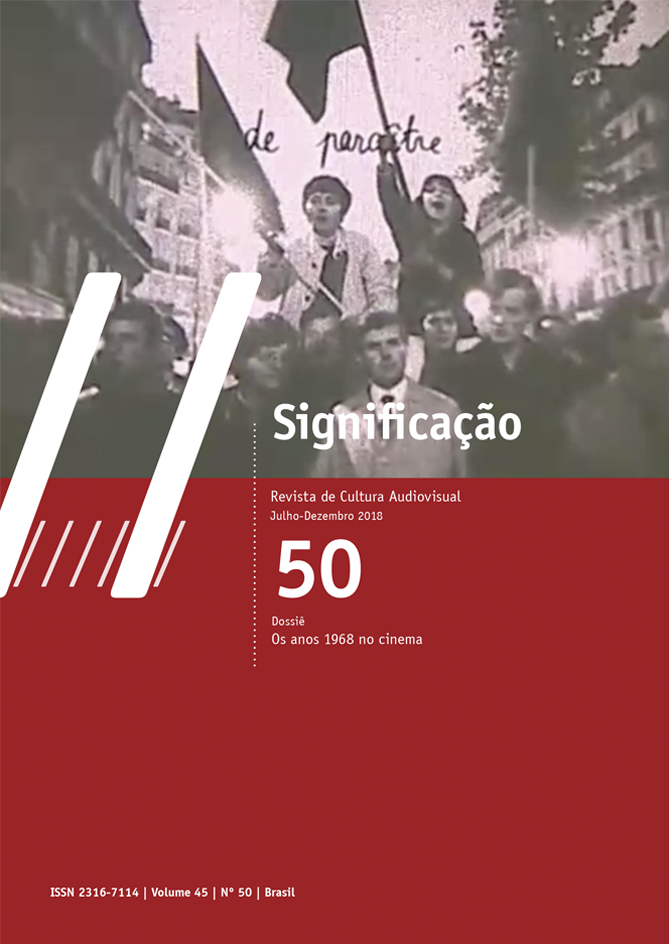Documentary Cinema and Genocide: towards an integral approach
DOI:
https://doi.org/10.11606/issn.2316-7114.sig.2018.144075Keywords:
documentary cinema, genocide, motives, functionsAbstract
A concept coined by Raphel Lemkin in 1944, genocide is considered the crime of crimes, in that direction documentary cinema, has played a preponderant role to know and testify about the various cases. This article is an advance of a larger investigation and it is proposed to introduce a multidisciplinary perspective that gathers and brings together the main contributions of genocide studies and documentary film studies. It is proposed to generate a systematization of the different approaches for the different cases with the objective to think recurrent motives in the representation of the cases, and rhetorical-aesthetic functions of the documentaries on genocides.Downloads
References
ABRAHAM, N., y TOROK, M. La corteza y el núcleo. Buenos Aires: Amorrortu, 2005.
ALVAREZ, A. Governments, Citizens, and Genocide. Bloomington & Indianapolis: Indiana University Press, 2001.
BRUZZI, S. New Documentary. Abingdon: Routledge, 2006.
COWIE, E. Recording Reality, Desiring the Real. Minneapolis: University of Minnesota Press, 2011.
FEIERSTEIN, D. El genocidio como práctica social. Buenos Aires: Fondo de Cultura Económica, 2007.
FRIEDMAN, J. y HEWITT, W. The History of Genocide in Cinema: Atrocities on Screen. New York: I.B.Tauris, 2017.
HIRSCH, M. The Generation of Postmemory. New York: Columbia University Press, 2012.
MOSES, A. D. “The Holocaust and Genocide”, in STONE, D. (Ed.). The Historiography of the Holocaust. New York: Palgrave Macmillan, 2004, p. 533-555.
NICHOLS, B. La representación de la realidad. Barcelona: Paidós, 1997.
NICHOLS, B. Introduction to Documentary. Bloomington: Indiana University Press, 2001.
NICHOLS, B. “El documental performativo" in Postverité. Murcia: Centro Párraga, 2003, p. 197-221.
PLANTINGA, C. Rhetoric and Representation in Nonfiction Film. New York: Cambridge University Press, 1997.
POWELL, CH. Barbaric Civilization. A Critical Sociology of Genocide. Montreal: McGill-Queen's University Press, 2011.
RENOV, M. “Toward a Poetics of Documentary”, in RENOV, M. (Ed.). Theorizing Documentary. New York: Routledge, 1993, p. 12-36.
RICOEUR, P. Texto, testimonio y narración. Santiago: Editorial Andrés Bello, 1983.
ROUSSO, H. The Haunting Past: History, Memory, and Justice in Contemporary France. Philadelphia: University of Pennsylvania Press, 2002.
TORCHIN, L. “Since We Forgot: Remembrance and Recognition of The Armenian Genocide in Virtual Archives”, in GUERIN, F.y HALLAS, R. (Eds.). The Image and The Witness. Trauma, Memory and Visual Culture. London & New York: Wallflower Press, 2003, p. 82-97.
TORCHIN, L. Creating the Witness: Documenting Genocide on Film, Video, and the Internet. Minneapolis: University of Minnesota Press, 2012.
WILSON, K. y CROWDER-TARABORRELLI, T. Film & Genocide. Madison: The University of Wisconsin Press, 2012.
Downloads
Published
Issue
Section
License
Copyright (c) 2018 Lior Zylberman

This work is licensed under a Creative Commons Attribution-NonCommercial 4.0 International License.
Authors who publish in this journal must agree with the following terms:
- Authors keep their copyrights and grant the journal first time publication rights, having their articles simultaneously licensed under the Creative Commons Attribution License, which allows sharing texts with authorship recognition and first publication on this journal for non-commercial purposes.
- Authors are allowed to make additional contracts, for a non-exclusive distribution of the article’s version published on this journal (e.g.: publishing in institutional repositories of articles or as a book chapter), with authorship recognition and first publication on this journal.
















